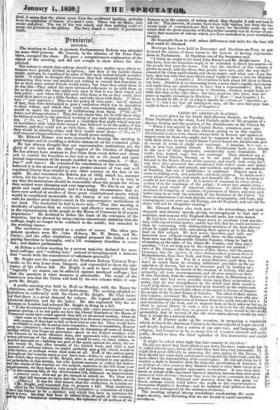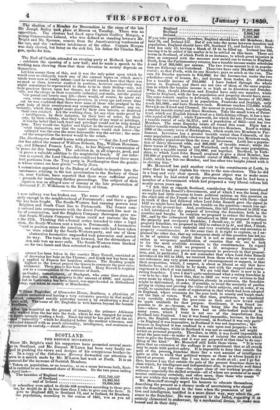LEEDS ON AMERICAN SLAVERY.
At a soiree given by the Leeds Anti-Slavery Society, on Tuesday, Peter Fairbairn in the chair, Lord Carlisle spoke of the progress of a slavery feeling and the position of the Abolitionists in the United Sti " hen I was myself in the United States, seventeen years ago, - much struck with the fact that, whereas among us in this country Abolitionist leaders were almost always held in honour and spoken ot respect even by those who might not be supposed to feel much sympa with their views, in the United States I never heard the Abolitionist vol. of except in terms of slight and contempt. I imagine, however, e. thisis now very greatly altered. The Abolitionists have now heron). in the eyes of their opponents, considerably more formidable. T1. excite fear, hatred, rage, but not contempt. They attacked my m valued friend Charles Sumner as he sat quiet and unsuspecting his seat in the Senate House of his country, and nearly took away his 1. and then they presented the executioher with votive canes and imitat cudgels. To batter, and assault, and mutilate, and murder, are indicati of hostility, but not of indifference or contempt. Depend upon it, cause is making real, and palpable, and daily progress. It enters now i every phase of private, and social, and domestic life. Every decision of courts of law teems with it. It is matter of comment in every circle; spoken of in the teachings of the pulpit ; it enters into almost every tam, the great staple of American existence. It affects the elections members of Congress, of senators, of governors of States, and may perh before long do so with the selection of the President of the Union. Un these circumstances I do wish that the voice of sympathy, and hope, and couragemeut, even over our old Europe, our old England, and our old Yo shire, will not be altogether wanting."
Mr. Edward Baines also took part in the proceedings, and mach eloquent anti-slavery speech, giving encouragement to that and et societies, and reasons why England should make her voice heard.
He had been very anxious for many years to ascertain what was his duty with regard to this matter, and he had felt that he could not better ' than by conversing with distinguished members of the Anti-slavery whom he might meet with, and asking their opinion as to the duty land on this subject. He had never, therefore, met with any honoured men without conferring with them on this subject. ' these men was the Honourable Charles Sumner, whom he had th of meeting at the table of his friend Mr. Forster, and they put tt question, "Can we help you by the expression of our opinion ? " swer of Mr. Sumner, like the answer of Mrs. Stowe, like the answe Chapman, like the answer of other distinguished persons from 0 Massachusetts, from New York, and from states still more remote —" You can help us.You do a great deal more good than her, don't do much harm in creating additional prejudice on the pa, upholders of slavery but you do immense good by holding up
So
and strengthening die hearts of the enemies of slavery, who need I sympathy, all your encouragement, and all your prayers on their It was, therefore, with the assurance of such men, so illustrious in t cause, and who had every possible claim upon their cooperation at pathy, that he was strengthened in the belief that their moral ii me would help them ; and he concurred most heartily in the sentiments
noble Earl as to the inevitable effect of the moral influence of Englam mu the people of the United States of America. The effect of their sympa a this country, continued Mr. Baines was to encourage those who pro,
that all-important emigration of freemen from the north into the back '0 and territories of the west, and to support them in their arduous but no effort to spread liberty in such a way as to hem in the old alaveholdi states of the south ; and thus, in process of time there would be the stro probability that in several of the old slave stales slavery would die ou that it would die a natural death.
Mr. W. E. Forster spoke on the occasion in proposing a resolntiOn which declared the American Union to be the stronghold of negro slaver) and deeply deplored that a nation of our own race, and language, a& religion, and bound to us by so many ties of common interest and sym- pathy, should be thus the chief upholder ' of this destructive and alai al system.
It might be asked what right has this country to interfere ?
He did not know that their efforts to put down the slave trade could fair be called interference, but at all events they had been very successful. Tim might find great difficulty in pursuing the same policy in the future, 1 they should not cease their exertions to extinguish the slave trade, and this upon Others the responsibility of its continuance. He did not claim for tl country a right to interfere with the domestic institutions of America, b as citizens of a free country they claimed a right to raise their voices in su port of freedom and against oppression everywhere. It was their duty speak on behalf of the oppressed slaves of America, because they were grea connected with slavery—because they were the great customers for the p duce of those slaves. England and Ameri-a were the two great Aril Saxon nations which stood, before the world as the representatives champions of political freedom ; and he believed that political fm-cede America WWI endangered by the existence of slavery.
The meeting adopted strong resolutions condemning the syste negro slavery, and declaring that we arc bound to exert ourselves overthrow. The election of a Member for Breconshire in the room of the late Sir Joseph Bailey took place at Brecon on Tuesday. There was no opposition. The electors had fixed upon Captain Godfrey Morgan, a young Conservative Liberal, who was defined as standing between Mr. Bright and Mr. Spooner, remote from the Americanizing tendencies of the one, and the exclusive intolerance of the other. Captain Morgan was duly elected, but being on the sick list, his father Sir Charles Mor- gan, spoke for him.
The Earl of Carlisle attended an evening party at Holbeck last week celebrate the opening of a new hall; and he made a speech to the working men showing them that their elevation in society depends on themselves.
Let him assure them of this, and it was the only point upon which he would ever so obliquely touch any of the current topics on which men's minds were now so busily intent—and he would remark here that there was no rank or class, however exalted in position' however exclusively they might sometimes be represented to them to be in their feeling—nay, not their gracious Queen upon her throne, not the nobles in their ancestral "fills, not the clergy in their venerable cathedral and stalls, not the gentry 'heir genial and -hearty easy life—there would, of course, be queer ex- 10138, cross curmudgeons, bilious growlers, in every age and every time out he was confident that there were none of these who grudged to the oreat body of their countrymen any competition, any advance, any su- oeriority, which they might make good by their own talents, or deserved their own conduct. Let the working class, let any class make proof by r intelligence, by their industry, by their love of order, by their esty, by their sobriety, that they were worthy of any trust or privilege, it was his belief that such trust and privilege would not be long darned hem. They would rise higher and higher in the social scale, if they so 'acted themselves, not that the upper classes would sink lower—the enlarged was the area the more honourable was the service ; the more ail the competition the keener would be the relish.
fhe Northampton Herald learns with pleasure "that the Lord Chan- dor has added the names of William Roberts, Esq., William Hensinan, .sq., and Edmund Francis Law, Esq., to her Majesty's commission of he peace for this borough. The selection is, in all respects, good, and -St prove a valuable addition to the magisterial bench. If our infer- tion is correct, the Lord Chancellor could not have selected three more lent partisans from the Tory party in Northampton than the gentle- ai whose names are here given."—Daily News.
k. commission appointed by the Bishop of Carlisle to inquire into the
• umstances relating to the last presentation to the Rectory of Great on, near Carlisle, have reported that there were sufficient pelmet e grounds for instituting further proceedings. The subject of their
tigation was an alleged case of simony at the late presentation of : Reverend F. P. Wilkinson to the Rectory of Orton.
1. new railway war has broken out. The scene of conflict is appro- ately enough in the neighbourhood of Portsmouth ; and there a great ttle has been fought. The South-Western had running powers over Brighton and South Coast line to Portsmouth. The former corn- y entered into arrangements with the direct Portsmouth line now in roe of construction, and the Brighton Company thereupon gave no- that South-Western Company's trains could not traverse the line ‘r the 27th. Thinking this a formal notice intended to raise a legal Alen, the South-Western sent a train to Portsmouth. A locomotive 'ound in position across the junction, and some rails had been taken • -se were relaid by the South-Western party, and one of them obstructive locomotive unguarded took possession and moved he way. The train then went forward, but the skirmishers of Lton side tore up more rails. The South-Western train blocked Jae for two hours and then retreated in good order.
nterest has been taken in the convict Mary Newell, convicted at of drowning her babe in the Thames ; and lynch law has been un- y applied to Francis her heartless seducer. The Reading people highest to the lowest prayed the Queen to commute the poor croa- nishment. Their prayer has been heard. Mary Newell is respited Lew to a commutation of the sentence of death.
on Conley, manufacturer, of Stockport, who some time since ab- from that town, with property to the amount of 40001. and against .flat in bankruptcy has been issued, was apprehended in Birkenhead L :day, and taken in custody at Manchester.
William Engledue, of Gloucester House; Southsea, a physician of dcrable eminence and having a very extensive practice in that neigh- ood, committed suicide yesterday morni* g by swallowing a dose of ' acid, The name of Dr. Engledue is well known beyond the bounds
/
'5-
his acquittal on the ground of insanity, the prisoner Atkinson walked from the bar into the dock, where he was engaged for nearly urs intently reading a book. Since his trial he has put off all the as-
s " imbecility " which he displayed before the medical witnesses, and et ucted himself with as much rationality, intelligence, and acuteness as y prisoner in custody,—Leeds Mercury.







































 Previous page
Previous page